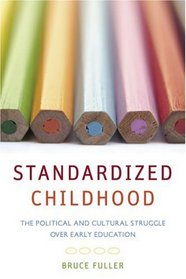kansasmom reviewed Standardized Childhood: The Political and Cultural Struggle over Early Education on + 19 more book reviews
Dr. Fuller provides a glimpse into two locations that have instituted universal preschool (Los Angeles and Oklahoma) and presents ample data to guide the reader in the beginning of an analysis on the benefits, and potential pitfalls, of preschool. It seems he believes, and I agree with him, that the push for universal preschool is unlikely to be able to meet the needs of children and families. The main problem is that social science is such a maze of interacting causes and effects, there's no way to tell what kinds of interventions or curricula are beneficial for what kinds of children. In addition, it's not clear if the investment in universal preschool would be worth the money. That's all taxpayer money that could be going toward programs that have more evidence of positive impact.
I found this book to be thoughtful and well-supported. It touched on many issues in my thoughts lately:
1. Taxpayer money being devoted to unproven methods. I'm distressed when states talk about investing vast sums of money in infant programs intended to take advantage of new research showing the proliferation of neurons in the first months or year. There is no evidence that any specific program would make any difference, or that any program is even necessary at all. They may even be detrimental. More research, yes, but let's devote most of our resources to proven areas until we know more what the impact would be.
2. Governments deciding what and how our children should learn. In particular, I worry that any state mandated curriculum should be imposed at the preschool level. It's a time for play and exploration. Even when programs are supposed to be developmentally appropriate, there's a push from school districts (especially if they are running the preschools) to teach reading and math skills in preschool in the hopes of raising test scores in elementary schools, despite nearly all the evidence that shows such direct skilling does not provide any long term benefits and may cause harm by introducing greater levels of stress on three and four year olds.
3. Childcare versus preschool. Now let's say a family has decided preschool is not the best option for their children, but both parents work. They need a safe and loving place for their kids during the day and begin a search. No options. In many states, all licensed providers are preschools for three and four year olds. You can't find a less structured environment. By requiring all licensed care-givers in a state (through universal preschool legislation) to follow a particular set of rules, state governments are eliminating choices for parents.
There's tons more data in the book about the benefits that some groups of young children receive through high-quality preschools, especially those that include home visits and work with the families as a whole. There are also examples of groups of young children that don't fare as well (like the white middle-class children who often suffer from emotional setbacks when in care more than 14 hours a week). He spends quite a bit of time exploring whether universal preschool can provide a respectful environment for other cultures.
I found this book to be thoughtful and well-supported. It touched on many issues in my thoughts lately:
1. Taxpayer money being devoted to unproven methods. I'm distressed when states talk about investing vast sums of money in infant programs intended to take advantage of new research showing the proliferation of neurons in the first months or year. There is no evidence that any specific program would make any difference, or that any program is even necessary at all. They may even be detrimental. More research, yes, but let's devote most of our resources to proven areas until we know more what the impact would be.
2. Governments deciding what and how our children should learn. In particular, I worry that any state mandated curriculum should be imposed at the preschool level. It's a time for play and exploration. Even when programs are supposed to be developmentally appropriate, there's a push from school districts (especially if they are running the preschools) to teach reading and math skills in preschool in the hopes of raising test scores in elementary schools, despite nearly all the evidence that shows such direct skilling does not provide any long term benefits and may cause harm by introducing greater levels of stress on three and four year olds.
3. Childcare versus preschool. Now let's say a family has decided preschool is not the best option for their children, but both parents work. They need a safe and loving place for their kids during the day and begin a search. No options. In many states, all licensed providers are preschools for three and four year olds. You can't find a less structured environment. By requiring all licensed care-givers in a state (through universal preschool legislation) to follow a particular set of rules, state governments are eliminating choices for parents.
There's tons more data in the book about the benefits that some groups of young children receive through high-quality preschools, especially those that include home visits and work with the families as a whole. There are also examples of groups of young children that don't fare as well (like the white middle-class children who often suffer from emotional setbacks when in care more than 14 hours a week). He spends quite a bit of time exploring whether universal preschool can provide a respectful environment for other cultures.




